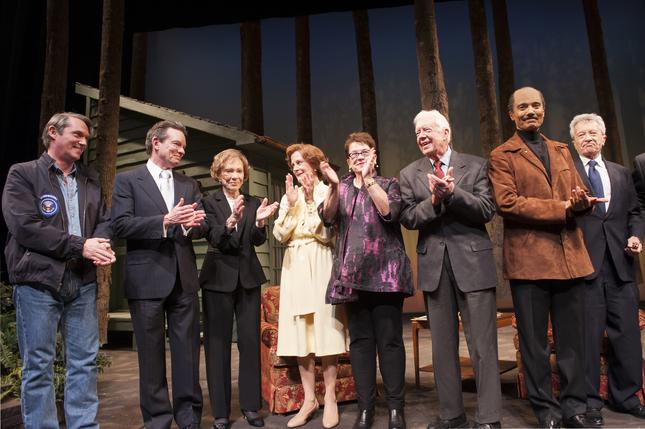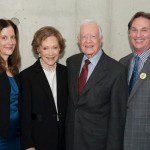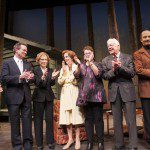Emotional Premiere: Carter and ‘Camp David’
By • April 11, 2014 0 1807

Only in Washington. You go to see a play, and you’re in the middle of a historic moment about history itself. History in the flesh.
That’s about the only way you can describe what happened when Arena Stage hosted the April 3 “red carpet” world premiere of “Camp David.” The play, by Pulitzer Prize-winner Lawrence Wright, is a two-hour dramatization of the 13 days in September 1978 that gave painful birth to the first and only peace treaty between an Arab state and Israel. Unexpected, unprecedented, the treaty was probably the signal achievement of the administration of President Jimmy Carter.
It’s hard to look at the production – which began haltingly, then kicked into gear with humor and power – as a critic. It had already been in previews leading up to this premiere, and it will continue through May 4. However, there will be no staging that resembles this one.
This night, with the audience in the Kreeger Theater on its feet clapping, Jimmy and Rosalynn Carter, who had been the centerpiece of what amounted to a theatrical state dinner, settled into their seats, and the staging of the play became something beyond itself.
Here we all were, watching a play in which actors were assembled on a Camp David set, knitting together the nights and days of difficult negotiations that would end in the words “Habemus Pacem” (“We have peace”): Richard Thomas, once John-Boy on “The Waltons,” but now a seasoned 55-year-old portraying Carter; veteran actor Ron Rifkin, inhabiting the part of Israel’s Prime Minister Menachem Begin like a rumpled suit; Tony Award-nominee Hallie Foote bringing sharp and gentle humor as Rosalynn Carter; Egyptian actor and activist Khaled Nabawy, matching the charisma that was part of the soul of Egypt’s President Anwar Sadat.
Even as the play heads for a climax that is preordained, there were times as events unfolded, and the arguments between Sadat and Begin reached the point of animus and rancor, when you could almost entertain doubts that the peace treaty would be signed.
The guiding force behind the production was Gerald Rafshoon, a television and film producer who was director of White House communications in the Carter Administration. It took him decades to bring it to the stage. Arena Stage Artistic Director Molly Smith directed.
Much of the material in the play is new, a good chunk of it coming from diaries kept by the Carters. Other material was garnered from interviews with participants in the negotiations. What you are seeing sounds as fresh as a batch of secrets spilled unexpectedly at a White House press conference.
The emotion that accumulated during the course of the drama on stage achieved its peak when the Carters – Jimmy Carter, now 90 years old, and Rosalynn Carter, 85 – slowly came up to the stage to meet the actors during the curtain call, to the applause of audience and cast. They were joined by Jehan Sadat, 80, the widow of Anwar Sadat, who was assassinated in 1981. “That was a moment,” someone remarked.
It was a Washington moment. The Carters did not stay for the post-play reception. Rafshoon, Smith, Wright and the actors mingled with audience members, including longtime Washington media stars such as Chris Matthews, Bob Schieffer and Andrea Mitchell. “I was a White House correspondent then,” Schieffer said. “This is what it was like. It felt exactly right and true.”
The play seems hardly dated, though time has worked its way with everyone alive in 1978, 35 years ago.
Begin died in 1992. The peace treaty, in which Egypt recognized Israel as a state and Israel returned the Sinai to Egypt, remains in place. In 1993, Prime Minister Yitzhak Rabin of Israel and Yasser Arafat, the head of the Palestinian Liberation Organization, signed an agreement of principles, the Oslo Accords, under President Bill Clinton. Rabin was assassinated in 1995 by an Israeli ultranationalist.
The four actors all inhabited their parts with the passions and quirks of real persons. Who knew, for instance, that Carter frequently prayed to and even railed against God? Thomas lets us see the whole man, insistent and unwilling to give up. Nabawy and Rifkin shine the most when, as Sadat and Begin, they are trying hardest to find common ground, especially when they share their experiences of time spent in prison. All three men were infused with their religious beliefs: Carter raised Southern Baptist, Begin haunted by the Holocaust, Sadat daring much in the Yom Kippur War and in going to Jerusalem and then to Camp David.
We saw it all up close, thanks to full, warm performances by Thomas, Foote, Rifkin and Nabawy. That’s all to the credit of the actors, directors, writer and producer. On this night, we got to see and feel a lot more than that. That’s theater, but that’s also Washington.
We woke up to read a story about the difficulties encountered by Secretary of State John Kerry in the Middle East: “With peace talks at impasse, Kerry’s image may be at risk.”
The last words of “Camp David,” like a pungent reproach, still echo from the night before: “We have peace.”
- Unique curtain call at Arena Stage’s Kreeger Theater: Richard Thomas, Lawrence Wright, Rosalynn Carter, Hallie Foote, Molly Smith, Jimmy Carter, Khaled Nabawy and Gerald Rafshoon. | Courtesy of Arena Stage





